Related Research Articles
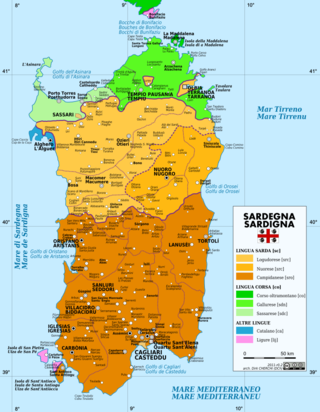
Sardinian or Sard is a Romance language spoken by the Sardinians on the Western Mediterranean island of Sardinia.

Duomo is an Italian term for a church with the features of, or having been built to serve as, a cathedral, whether or not it currently plays this role. Monza Cathedral, for example, has never been a diocesan seat and is by definition not a cathedral. On the other hand, the city of Trevi no longer has a bishop, although it once did, and the erstwhile cathedral of Emilianus of Trevi is now a mere church. By contradistinction, the Italian word for a cathedral sensu stricto is cattedrale. There is no direct translation of "duomo" into English, leading to many such churches being erroneously called "cathedral" in English, regardless of whether the church in question hosts a bishop.

Sassarese is an Italo-Dalmatian language and transitional variety between Sardinian and Corsican. It is regarded as a Corso–Sardinian language because of Sassari's historic ties with Tuscany and geographical proximity to Corsica. Despite the robust Sardinian influences, it still keeps its Corsican roots, which closely relate it to Gallurese; the latter is linguistically considered a Corsican dialect despite its geographical location, although this claim is a matter of controversy. It has several similarities to the Italian language, and in particular to the old Italian dialects from Tuscany.
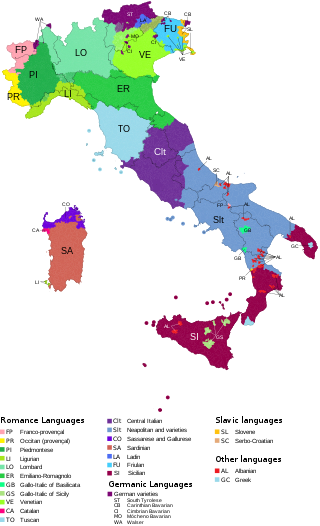
The languages of Italy include Italian, which serves as the country's national language, in its standard and regional forms, as well as numerous local and regional languages, most of which, like Italian, belong to the broader Romance group. The majority of languages often labeled as regional are distributed in a continuum across the regions' administrative boundaries, with speakers from one locale within a single region being typically aware of the features distinguishing their own variety from one of the other places nearby.

Emanuela Trane, stage name "Dolcenera" [ˌdoltʃeˈneːra], is an Italian singer, songwriter and actress. She rose to fame in 2003, after winning the newcomers' section of the Sanremo Music Festival, but she achieved commercial success in Italy only in 2005, when she won the music-based reality show Music Farm and she released her second album, Un mondo perfetto. In 2005 she was also awarded Best New Artist of the Year at the Italian Meeting of Independent Record Labels and she received the De André Award for Best Emerging Artist.

Arrosticini are a class of traditional dishes of skewered grilled meat characteristic of Molisana and Abruzzese cuisine. Arrosticini are typically made from mutton or lamb cut in chunks and pierced by a skewer. It is cooked on a brazier with a typically elongated shape, called furnacella as it resembles a gutter.
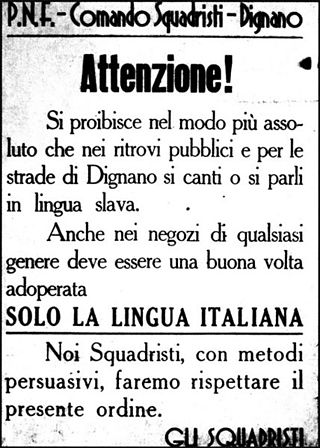
Italianization is the spread of Italian culture, language and identity by way of integration or assimilation.
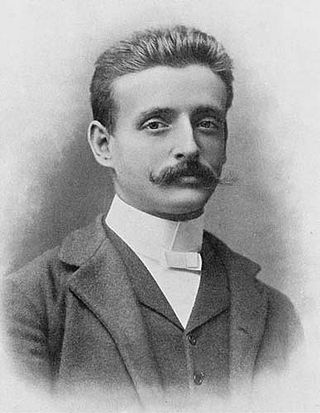
Guido Boggiani (1861–1902) was an Italian painter, draftsman, photographer, and ethnologist who in 1887 traveled through the interior of Brazil, Bolivia and Paraguay to document the lives of Indians in the region. Now hailed as a "pioneer of fieldwork" in Italian ethnology, he was ritually killed by natives in 1902.
Eugenio Miccini was an Italian artist and writer, considered to be one of the fathers of Italian visual poetry.

The Perfect Fusion was the 1847 act of the Savoyard king Charles Albert of Sardinia which abolished the administrative differences between the mainland states and the island of Sardinia, in a fashion similar to the Nueva Planta decrees between the Crown of Castile and the realms of the Crown of Aragon between 1707 and 1716 and the Acts of Union between Great Britain and Ireland in 1800.
Il Devoto–Oli. Vocabolario della lingua italiana is one of the best-known monolingual dictionaries of the Italian language, edited by Luca Serianni and Maurizio Trifone. Its first edition is dated 1971 and it is published annually by the Le Monnier.

Giacomo Devoto was an Italian historical linguist and one of the greatest exponents of the twentieth century of the discipline. He was born in Genoa and died in Florence.
Luca Serianni was an Italian linguist and philologist.

Pietro Trifone, is an Italian linguist.
DeepCon is an Italian science fiction, fantasy and horror fan convention, covering multiple entertainment forms and media, mixed with a dose of actual, real-world science.
Emidio De Felice was an Italian linguist and lexicographer.
Gian Carlo Oli was an Italian lexicographer.
Nicoletta Maraschio is an academic teacher of "History of Italian Language" at University of Florence. She was the first woman in charge of Accademia della Crusca, from 2008 to 2014, succeeding Francesco Sabatini.
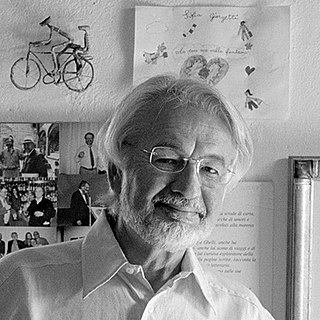
Giuliano Ghelli was an Italian painter who produced several series of works, each rooted in the practice of drawing. An autodidact, Ghelli's early influences were informalism and geometric abstraction, from which he developed a cartoon-like style of figuration inspired by pop art and Surrealism. Ghelli was said to draw on affect over intellect, working personal interests and relations, and, later, dreams into his pictures; the Italian word racconto often appears in the artist's titles.
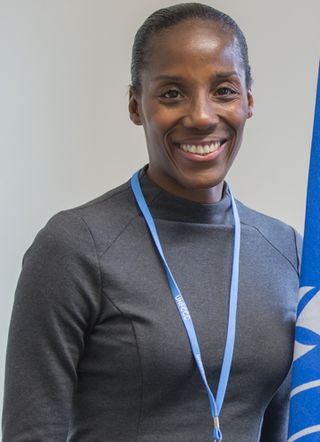
The Naturalized athletes of Italy are those naturalized citizens who are part, or have been part, of the Italy national athletics team.
References
- ↑ CV of Maurizio Trifone
- ↑ «la ricerca di Maurizio Trifone, fondata su riscontri puntuali e su solide argomentazioni, occupa un posto di rilievo nel panorama degli studi sul romanesco antico e contribuisce a migliorare sensibilmente le nostre conoscenze sulla lingua in uso a Roma nel secondo Quattrocento» (Maurizio Dardano, presentazione a M. Trifone, Le carte di Battista Frangipane, Heidelberg, Winter, 1998, p. 7).
- ↑ «Gran parte della produzione diaristica e memorialistica quattrocentesca di provenienza romana, com'è generalmente noto agli studiosi di romanesco antico, è giunta sino a noi in copie tarde e per molti versi, per quel che è della caratura linguistica, del tutto inattendibili o francamente depistanti [...]. Ancor più utile appare allora questo bel volume di Maurizio Trifone, che pubblica le carte autografe, quasi del tutto inedite, di un ricco mercante e latifondista di Roma, Battista Frangipane, esponente di una delle più antiche famiglie della nobiltà cittadina [...]. Inutile dire che all'Autore va il nostro plauso per aver ben individuato gli assi portanti e le idiomorfie pertinenti ora al tipo "annotazione" ora al tipo "polizza", e per essersi arrischiato peraltro a immettersi in un insidiosissimo solco, quello delle strutture sintattico-testuali-argomentative [...]. Analisi del genere, ci piace ripeterlo, cominciano a far capolino e speriamo possano portare in futuro a stabilire di volta in volta precise architetture testuali. Una parte di merito andrà naturalmente anche a chi, come Maurizio Trifone, non si è sottratto all'intento di agevolare il cammino della ricerca in questa direzione» (Massimo Arcangeli, recensione a M. Trifone, Le carte di Battista Frangipane, Heidelberg, Winter, 1998, in "Contributi di Filologia dell'Italia Mediana", XIII (1999), pp. 259-268).
- ↑ «A differenza di altre indagini sul parlato giovanile, che presentano soltanto frammenti lessicali isolati, trascurando le strutture conversazionali del "giovanilese", i modi di organizzare il discorso, i comportamenti non verbali, la ricerca di Trifone allarga il campo d'osservazione a tutta l'interazione comunicativa e ricostruisce con sicuri strumenti metodologici e interpretativi l'intero mondo di un singolo gruppo giovanile nei suoi aspetti linguistici ed extralinguistici» (Claudio Giovanardi, recensione a M. Trifone, Aspetti linguistici della marginalità nella periferia romana, Perugia. Guerra, 1993, in "RID, Rivista Italiana di Dialettologia", 1994, vol. 18, p. 288).
- ↑ il Devoto-Oli dei sinonimi e contrari
- ↑ Cfr. Maria Silvia Rati, recensione a M. Trifone, Il Devoto-Oli dei Sinonimi e Contrari. Con analoghi, generici, specifici, inversi e gradazioni semantiche, in "Studi Linguistici Italiani", 2014, vol. XL, fasc. I, pp. 141-144: «Il rischio di considerare indifferenziatamente come sinonimi termini che lo sono soltanto in determinate accezioni si evita del tutto consultando il DOSC (= Il Devoto-Oli dei sinonimi e contrari), che distingue in modo chiaro i diversi significati di un lemma, illustrando ciascuno di essi con una definizione e con un esempio. La presenza di un articolato sistema di marche, che comprende anche nuove etichette di registro, rappresenta un altro punto di forza del DOSC. Ecco, per esempio, come sono presentati i sinonimi di bambino: “bimbo, creatura, piccolo, pupo, ragazzino, ingl. baby, [grassottello] bamboccio, [vivace] frugolo, [nei primi mesi di vita] bebè, lattante, neonato, poppante. SCHERZ marmocchio. SPREG moccioso. ELEV fanciullo. LETT bambolo, fantolino, pargoletto, pargolo, [nei primi mesi di vita] infante. REGION napol. piccirillo. NON COM putto. ARC mammolo”. Oltre alla presenza di diverse etichette di registro, in questa lista di sinonimi si possono osservare anche altre peculiarità del DOSC: prima fra tutte l’inserimento tra parentesi quadre di indicazioni semantiche accessorie, che rendono più sofisticata l’operazione di differenziazione semantica. Si evita così al lettore di inferire erroneamente che i sinonimi associati a uno stesso significato siano da ritenersi tra loro intercambiabili (non viene creata, in altre parole, l’illusione della sinonimia assoluta). Il carattere sintetico delle chiose tra parentesi quadre consente inoltre al DOSC di ottenere un felice equilibrio fra dettaglio di informazioni e asciuttezza della voce, non facile da raggiungere in un dizionario di questo tipo. Scorrendo la lista di sinonimi di bambino riportata sopra, si può notare, inoltre, la presenza del napoletano piccirillo, etichettato come REGION napol. Il DOSC, distaccandosi dalla prassi, prevalente nei dizionari, di marcare i geosinonimi solo come region., ne specifica in modo sistematico l’area di provenienza. Non diversamente dall’attenzione riservata alle etichette di registro, anche quella per le marche diatopiche appare quanto mai opportuna, se si considera che in italiano contemporaneo l’abbassamento del grado di formalità determina anche l’affioramento di tratti regionali e dialettali, con conseguente difficoltà nel distinguere il lessico dell’italiano da quello dei dialetti. La quota di informazioni utili per l’utente è incrementata, nel dizionario, dalla presenza di due contrassegni di modernità lessicografica: l’indicazione delle reggenze, che è regolarmente fornita, oltre che per i verbi, per gli aggettivi e i sostantivi, spesso trascurati, per questo aspetto, dai dizionari, e l’ampio spazio riservato alle polirematiche, trattate allo stesso modo delle unità lessicali singole e inserite frequentemente nelle liste di sinonimi. Alle forme gergali il DOSC riserva una cura particolare. Soprattutto, le voci marcate come GERG sono distinte in base all’appartenenza ai diversi tipi di gergo: giovanile, della malavita, militare e dei tossicodipendenti. La chiara individuazione della provenienza gergale delle voci può essere utile specialmente al lettore giovane: per esempio, la presenza dell’etichetta giov. avverte dell’appartenenza della parola a un codice di cui un giovane può servirsi legittimamente solo all’interno del gruppo dei pari o per particolari esigenze espressive. Una notevole precisione caratterizza anche l’indicazione degli àmbiti settoriali. Ad acquistare rilievo non è solo il numero di etichette utilizzate (185), ma anche il fatto che esse siano applicate, oltre che ai lemmi, ai sinonimi: si ottiene così una doppia etichettatura, una per il lemma e una per i sinonimi, che rende evidenti gli eventuali passaggi dalle voci comuni alle voci tecniche e viceversa. Le peculiarità segnalate fin qui nel DOSC relativamente ai sinonimi riguardano anche i contrari e gli inversi: dall’applicazione delle marche di registro e di settore, alla segnalazione delle reggenze, all’importanza attribuita alle polirematiche».
- ↑ «"dizionario d'autore", tra i più noti nel quadro della lessicografia italiana contemporanea», il Devoto-Oli «è rinato nella revisione moderna di due linguisti del nostro tempo, gli storici della lingua Luca Serianni e Maurizio Trifone» (Claudio Marazzini, L'ordine delle parole. Storia di vocabolari italiani, Bologna, il Mulino, 2009, p. 412).
- ↑ «del Devoto-Oli, dizionario non solo di grande fortuna, ma anche di grande qualità e personalità, [...] è appena uscita una nuova edizione curata da un altro accademico della Crusca, Luca Serianni, insieme con Maurizio Trifone. Saluto in questa nuova edizione, finalmente, un dizionario italiano che indica sistematicamente le reggenze dei verbi, che sono divenute uno dei punti di maggiore incertezza della lingua attuale (basta ascoltare e leggere) e che in assenza di norme sufficientemente generali e razionalizzabili non possono essere affidate alle grammatiche, ma trovano in un dizionario il luogo deputato per la loro trattazione» (Pietro G. Beltrami, La lessicografia italiana a Firenze e l’Opera del Vocabolario Italiano, in Firenze e la lingua italiana fra nazione ed Europa, Atti del Convegno di studi, Firenze, 27-28 maggio 2004, a cura di Nicoletta Maraschio, Firenze, Firenze University Press, 2007, pp. 181-188).
- ↑ «In qualità di docente di italiano ho per molto tempo constatato, non senza un pizzico di frustrazione, che rispetto ad altre lingue (come ad esempio il francese), l’italiano non disponeva di manuali incentrati in modo esauriente sui singoli livelli descritti dal Portfolio europeo delle lingue. In altri termini, se da tempo esistono manuali di francese orientati alle competenze linguistiche previste dai livelli A1, A2, B1 e B2 (il livello che gli studenti dovrebbero raggiungere alla fine del liceo), ciò non accadeva ancora per l’italiano. Ora, ritengo che per lo meno i quattro manuali intitolati Affresco italiano colmino tale lacuna. Infatti, ogni singolo volume permette agli utenti di approfondire specifici contenuti linguisti e comunicativi, morfosintattici, lessicali, fonologici, socioculturali. Gli studenti vengono preparati ai vari livelli mediante attività di ascolto, di lettura, di scrittura, di presa di parola nonché di osservazione. Personalmente, sono felice della pubblicazione di questi manuali (e di altri che certamente seguiranno) in quanto si può finalmente – rispondendo al desiderio dei docenti – considerare un po’ meno l’italiano come il “parente povero” delle lingue nazionali. Con questo non voglio affermare che un manuale possa capovolgere l’insegnamento dell’italiano in Svizzera, ma può quanto meno agevolare il lavoro di chi si impegna quotidianamente nella promozione della lingua e della cultura italian»a (Donato Sperduto, L’italiano “in carne e ossa”, in "Babylonia", 1, 2008, p. 64).
- ↑ Affresco italiano
- ↑ Numbers of «Letterature straniere &» published by Carocci
- ↑ Numbers of «Letterature straniere &» published by Aracne